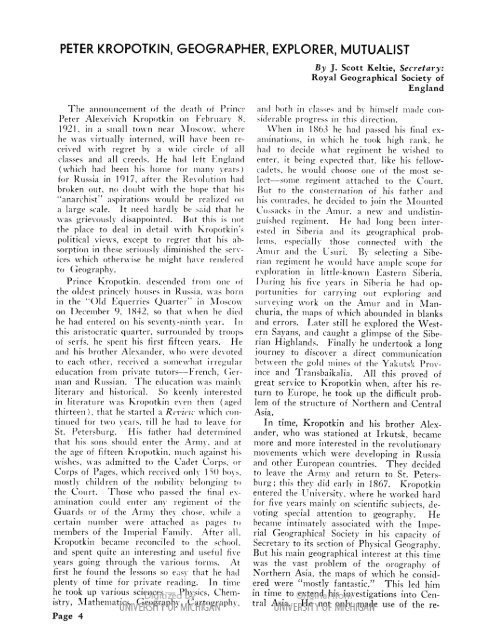Centennial Expressions on Peter Kropotkin 1842-1942.
Centennial Expressions on Peter Kropotkin 1842-1942.
Centennial Expressions on Peter Kropotkin 1842-1942.
Create successful ePaper yourself
Turn your PDF publications into a flip-book with our unique Google optimized e-Paper software.
PETER KROPOTKIN, GEOGRAPHER, EXPLORER, MUTUALIST<br />
By J. Scott Keltie, Secretary:<br />
Royal Geographical Society of<br />
England<br />
The announcement of the death of Prince<br />
<strong>Peter</strong> Alexeivich <strong>Kropotkin</strong> <strong>on</strong> February 8,<br />
1921, in a small town near M loscow, where<br />
he was virtually interned, will have been received with regret by a wide circle of all<br />
classes and all creeds. He had left England<br />
(which had been his home for many years)<br />
for Russia in 1917, after the Revoluti<strong>on</strong> had<br />
broken out, no doubt with the hope that his<br />
"anarchist" aspirati<strong>on</strong>s would be realized <strong>on</strong><br />
a large scale. It need hardly be said that he<br />
was grievously disappointed. But this is not<br />
the place to deal in detail with <strong>Kropotkin</strong>'s<br />
political views, except to regret that his absorpti<strong>on</strong> in these seriously diminished the services which otherwise he might have rendeered<br />
to Geography.<br />
Prince <strong>Kropotkin</strong>, descended from <strong>on</strong>e of<br />
the oldest princely houses in Russia, was born<br />
in the "Old Equerries Quarter" in Moscow<br />
<strong>on</strong> December 9, <strong>1842</strong>, so that when he died<br />
he had entered <strong>on</strong> his seventy-ninth year. In<br />
this aristocratic quarter, surrounded by troops<br />
of serfs, he spent his first fifteen years. He<br />
and his brother Alexander, who were devoted<br />
to each other, received a somewhat irregular<br />
educati<strong>on</strong> from private tutors-FIrench, German and Russian. The educati<strong>on</strong> was mainly<br />
literary and historical. So keenly interested<br />
in literature was <strong>Kropotkin</strong> even then (aged<br />
thirteeni), that he started a Revic-w which c<strong>on</strong>tinued for two years, till he had to leave for<br />
St. <strong>Peter</strong>sburg. His father had determined<br />
that his s<strong>on</strong>s should enter the Arimy, anld at<br />
the age of fifteen <strong>Kropotkin</strong>, much against his<br />
wishes, was admitted to the Cadet Corps, or<br />
Corps of Pages, which received <strong>on</strong>ly 150 boys,<br />
mostly children of the nobility bel<strong>on</strong>ging to<br />
the Court. Those who passed the final examinati<strong>on</strong> could enter any regiment of the<br />
Guards or of the Army they chose, while a<br />
certain number were attached as pages to<br />
members of the Imperial Family. After all,<br />
<strong>Kropotkin</strong> became rec<strong>on</strong>ciled to the school,<br />
and spent quite an interesting and useful five<br />
years going through the various forms. At<br />
first he found the less<strong>on</strong>s so easy that he had<br />
plenty of time for private reading. In time<br />
he took up various sciences - Physics, Chemistry, Mathematics, Geography, Cartography,<br />
Page 4<br />
and both in classes and by himself made c<strong>on</strong>siderable progress in this directi<strong>on</strong>.<br />
When in 1863 he had passed his final examinati<strong>on</strong>s, in which he took high rank, he<br />
had to decide what regiment he wished to<br />
enter, it being expected that, like his fellowcadets, he would choose <strong>on</strong>e of the most select-some regiment attached to the Court.<br />
But to the c<strong>on</strong>sternati<strong>on</strong> of his father and<br />
his comrades, he decided to join the Mounted<br />
Cossacks in the Amur. a new and undistinguished regiment. He had l<strong>on</strong>g been interested in Siberia and its geographical problems, especially those c<strong>on</strong>nected with the<br />
Amnmr and the Usuri. By selecting a Siberian regiment he would have ample scope for<br />
explorati<strong>on</strong> in little-known Eastern Siberia.<br />
During his five years in Siberia he had opportunities for carrying out exploring and<br />
surveying work <strong>on</strong> the Amiur and in Manchuria, the maps of which abounded in blanks<br />
and errors. Later still he explored the Western Sayans, and caught a glimpse of the Siberian Highlands. Finally he undertook a l<strong>on</strong>g<br />
journey to discover a direct communicati<strong>on</strong><br />
between the gold mines of the Yakutsk Province and Transbaikalia. All this proved of<br />
great service to <strong>Kropotkin</strong> when, after his return to Europe, he took up the difficult problem of the structure of Northern and Central<br />
Asia.<br />
In time, <strong>Kropotkin</strong> and his brother Alexander, who was stati<strong>on</strong>ed at Irkutsk, became<br />
more and more interested in the revoluti<strong>on</strong>ary<br />
movements which were developing in Russia<br />
and other European countries. They decided<br />
to leave the Army and return to St. <strong>Peter</strong>sburg; this they (lid early in 1867. <strong>Kropotkin</strong><br />
entered the University, where he worked hard














![The Philosophy of Progress [pdf]](https://img.yumpu.com/14077359/1/190x245/the-philosophy-of-progress-pdf.jpg?quality=85)

